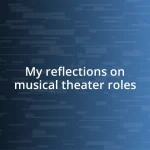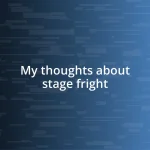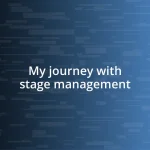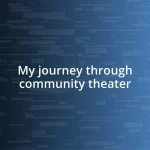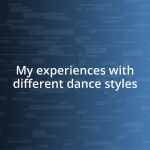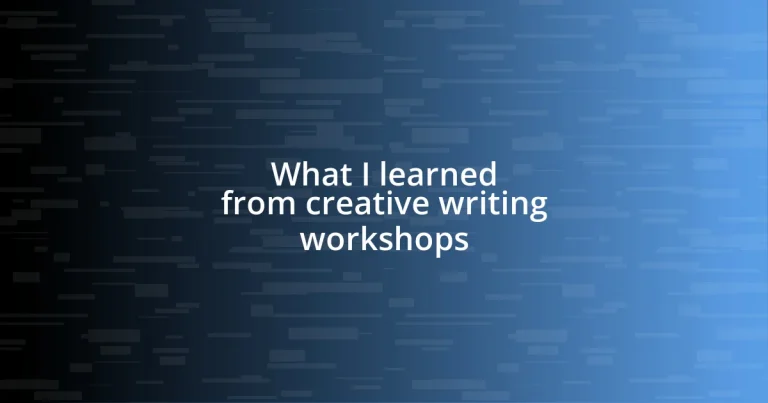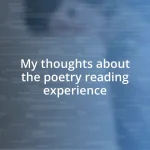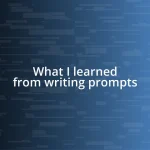Key takeaways:
- Workshops foster a supportive community, offering constructive feedback that propels writers to grow and refine their craft.
- Engaging in various workshop types exposes writers to different techniques, enhancing skills like editing, storytelling, and confidence-building.
- Continuous growth as a writer is achieved through setting specific goals, joining writing groups, and maintaining curiosity about the writing process.
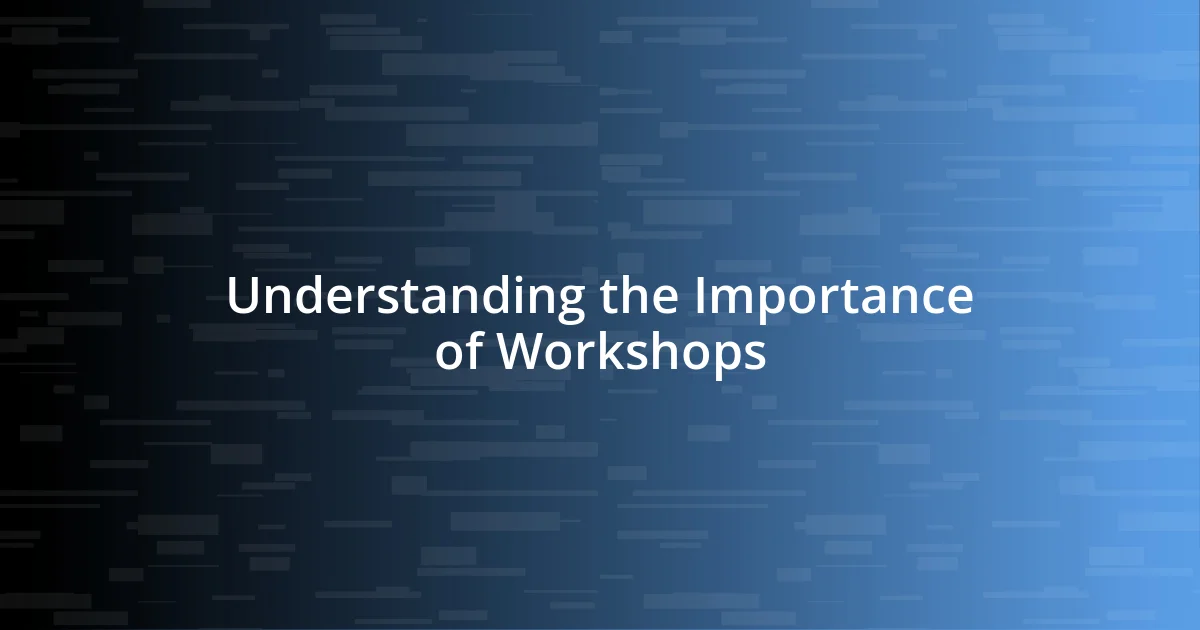
Understanding the Importance of Workshops
Workshops serve as a creative haven for writers at all levels. I remember stepping into my first workshop feeling a mix of excitement and apprehension. It was there, surrounded by passionate peers, that I realized we all shared the same fears and aspirations. Isn’t it comforting to know you’re not alone in your journey?
The importance of workshops goes beyond mere skill development; they cultivate a sense of community and support. In one workshop, I received constructive criticism on a piece I was deeply connected to. Initially, my heart sank, but then I recognized that the feedback was rooted in genuine care for my growth as a writer. Can you think of a time when feedback, although hard to hear, ultimately propelled you forward?
Moreover, workshops offer a structured space where creativity can thrive. I learned new techniques that I would have never explored on my own. Each session pushed me to experiment with different styles and forms, igniting my creativity in ways I couldn’t have predicted. Have you ever stepped out of your comfort zone and surprised yourself with what you created? That’s the magic of workshops.
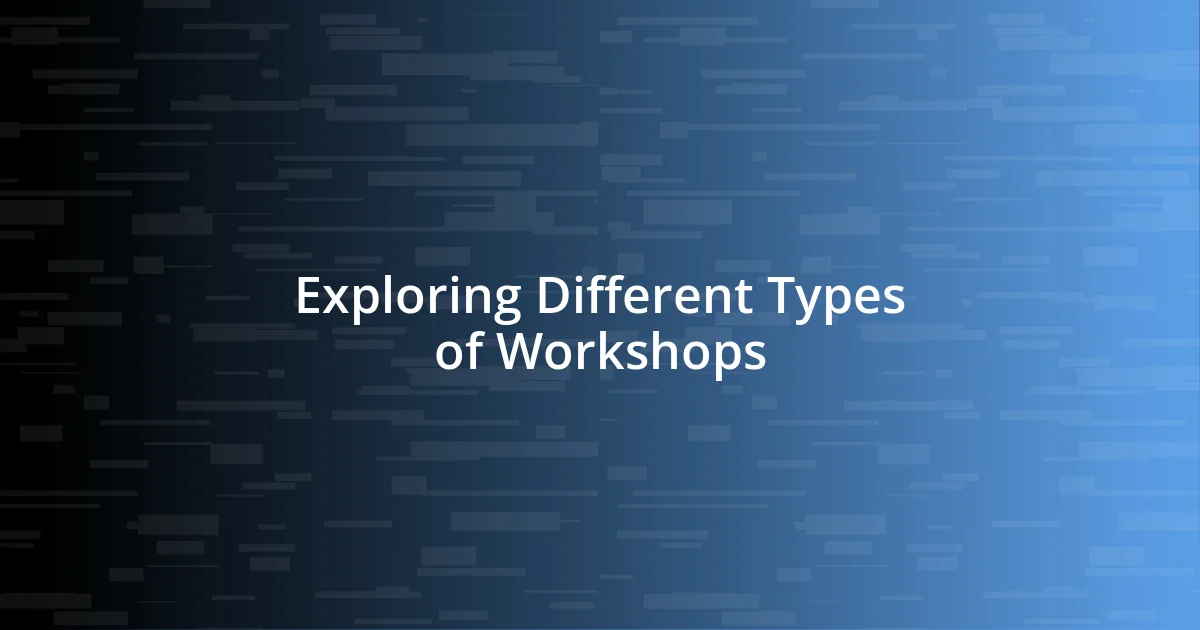
Exploring Different Types of Workshops
Exploring different types of workshops has truly expanded my perspective on the creative process. I’ve attended a variety of sessions ranging from poetry to screenwriting, and each has left a unique stamp on my writing journey. One particularly memorable workshop focused on flash fiction. The challenge of crafting a complete story in under a thousand words forced me to strip my writing down to its essentials. It amazed me how much emotion and depth could be packed into such a brief narrative.
Here are some common types of creative writing workshops I’ve encountered:
-
Genre-Specific Workshops: These sessions often focus on a single genre, like fantasy or memoir, allowing participants to immerse themselves in specific techniques and conventions.
-
Themed Workshops: Centered around a particular theme, such as love or nature, these workshops encourage writers to explore how different viewpoints can enhance a single idea.
-
Peer Critique Sessions: In these workshops, participants share their work and receive feedback from fellow writers, which fosters an understanding of audience perception.
-
Prompt-Based Workshops: Driven by creative prompts, these sessions help ignite spontaneous writing, helping writers break through blocks and explore unexplored ideas.
-
Online Workshops: Thanks to technology, these have become increasingly popular. They provide accessibility and flexibility, allowing writers from all over the globe to share their work and insights.
Diving into various types of workshops has illuminated paths I never knew existed, demonstrating that there’s always something new to learn in the craft of writing.
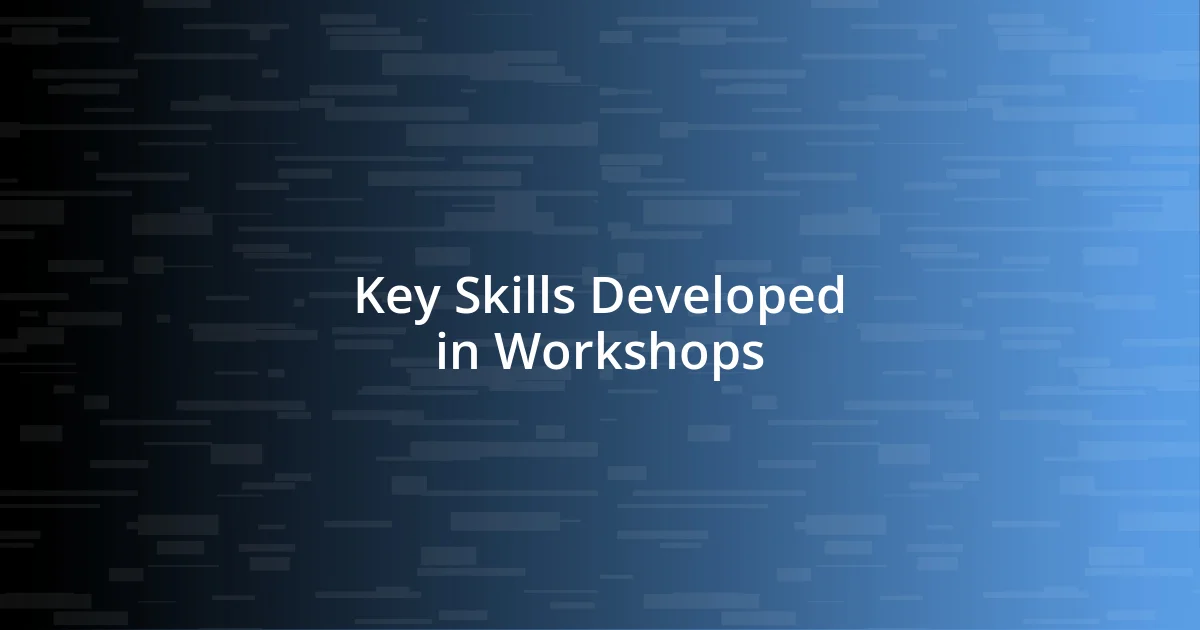
Key Skills Developed in Workshops
Participating in creative writing workshops has definitely sharpened my writing skills in unexpected ways. For instance, the emphasis on honing my editing skills was a game changer. During a workshop, we focused on revising our pieces, and I found that stepping back and viewing my work with a critical eye was both challenging and enlightening. Have you ever felt like your first draft was perfect, only to realize it needed a bit of polishing? The process of editing became almost like sculpting—a way to trim away the excess and reveal the core of what I wanted to say.
Another skill that blossomed in these workshops was storytelling. Engaging in discussions about narrative structure not only opened my eyes to how stories function but also helped me discover my unique voice as a writer. One night, a fellow participant shared her story and captivated us with vivid imagery and character depth. I remember thinking, “I want to write like that!” It sparked a fierce desire within me to delve deeper into my characters and settings.
Lastly, building confidence has been a surprising yet invaluable takeaway. At first, sharing my work made my heart race. But with each workshop, as I shared my stories and received encouragement, that anxiety transformed into a powerful sense of validation. I started to relish those moments of vulnerability, knowing they were stepping stones to growth. Have you ever had the experience of feeling seen and appreciated for your creativity? It’s a feeling that drives you to keep telling your stories.
| Skill Developed | Description |
|---|---|
| Editing Skills | Learning to critically assess and refine my work became a transformative experience, almost like sculpting a masterpiece. |
| Storytelling Techniques | Understanding narrative structure clarified my approach and helped me develop a unique voice as a writer. |
| Confidence Building | Sharing my work in a supportive environment turned initial anxiety into a sense of belonging and validation in my creative pursuits. |
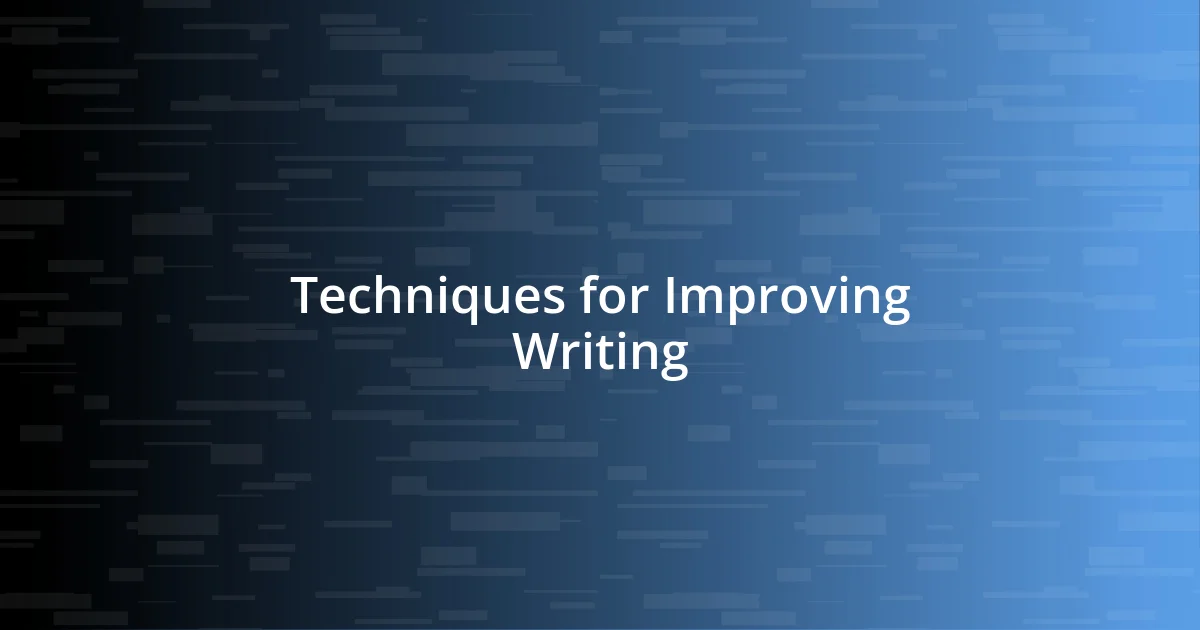
Techniques for Improving Writing
When evaluating techniques for improving writing, one aspect that I’ve found invaluable is the practice of writing regularly. In one workshop, we committed to a daily writing habit. This simple yet powerful technique transformed my approach to creativity. Have you ever noticed how ideas can flow more freely when you’re not waiting for inspiration to strike? Writing every day not only honed my skills but also helped me discover unique angles for stories that I might otherwise overlook.
Another technique that stuck with me was the use of sensory detail. During a lesson on immersive writing, we were encouraged to engage all five senses in our descriptions. I experimented by describing a sunset, not just through colors, but by evoking how the air felt cool against my skin and the faint scent of blooming jasmine lingered nearby. This exercise taught me that tapping into sensory experiences could make my scenes leap off the page. Who wouldn’t want their readers to feel like they’re right there, living the moment alongside the characters?
Finally, I learned the profound impact of reading widely outside the genre I typically write in. Attending a workshop where we discussed books from various genres opened my eyes to different narrative techniques and stylistic choices. I remember diving into a historical fiction novel; the intricate details and character development inspired me to infuse more depth into my own work. Have you ever found a technique or style in an unexpected place that completely shifted your creative perspective? Reading beyond my comfort zone has enriched my writing life in ways I never anticipated.
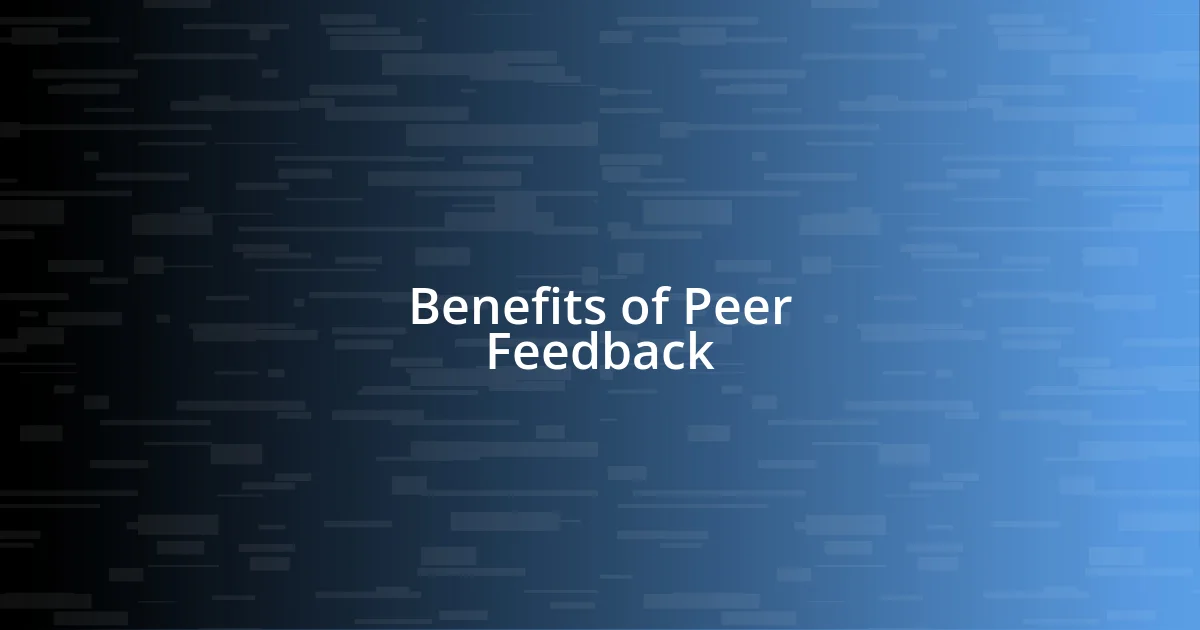
Benefits of Peer Feedback
Peer feedback is one of the most enriching elements of a creative writing workshop. In my experience, receiving constructive criticism from fellow writers opened my eyes to perspectives I hadn’t considered before. I remember a moment when a participant pointed out a plot gap in my piece; it felt like a light bulb moment. Have you ever realized that a small oversight could completely transform your story? That’s the beauty of peer feedback—it reveals blind spots while allowing for growth and change.
Moreover, I found that giving feedback is just as enlightening as receiving it. When I critiqued another writer’s work, I often discovered valuable lessons applicable to my own writing. For instance, during one session, I suggested tightening a scene for impact, and later, I realized my own writing could benefit from that same approach. Isn’t it fascinating how we can learn from others’ experiences? Engaging in this exchange can enrich our own skill sets in unexpected ways.
Lastly, the sense of community cultivated through peer feedback is worth mentioning. Sharing the vulnerability of our drafts fosters connections that often extend beyond the workshop. I recall forming a bond with a fellow writer over our mutual struggles with character development. Every time I received feedback, it felt like a collective effort toward improvement, making the process not just about honing our craft but also about building friendships. Have you ever felt the solidarity of a group united by a shared passion? It certainly added depth to my writing journey.
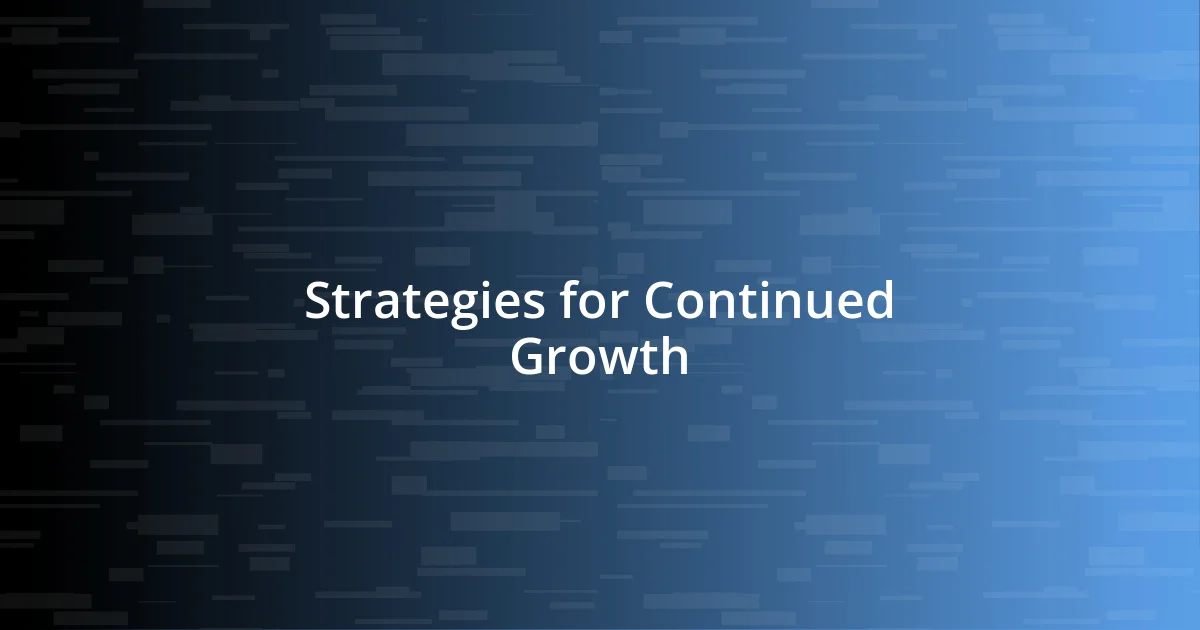
Strategies for Continued Growth
Continuing to grow as a writer requires an active commitment to honing one’s craft. One strategy I’ve found particularly effective is setting specific writing goals. For instance, rather than just saying I’ll write more, I create targeted objectives like completing one short story each month. How satisfying is it to check off those goals and see your growth take shape? This structured approach not only keeps me accountable but also provides tangible milestones that fuel my motivation.
Joining writing groups beyond workshops has also been instrumental in my ongoing development. I remember joining a local book club where we discussed literary techniques and themes, which forced me to engage with texts more critically. Have you experienced the thrill of dissecting a book alongside passionate readers? The discussions sparked inspiration and challenged my own perspectives, pushing me to experiment with my writing style and embrace new ideas.
Lastly, I can’t overstate the importance of staying curious about the writing process itself. I often schedule time to explore new writing exercises or prompts that ignite my creativity. For example, I once dabbled in poetry, a genre I hadn’t explored before, and it opened up a different way of expressing emotion. Isn’t it amazing how stepping out of our comfort zones can lead to unexpected growth? Embracing this curiosity fosters a continuous cycle of learning, ensuring that my writing journey remains vibrant and dynamic.






